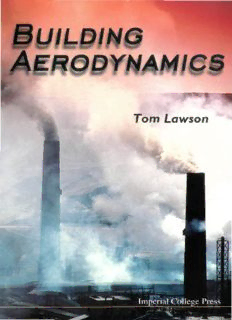
Building Aerodynamics PDF
Preview Building Aerodynamics
BU/LD/NG AERODYWAM/CS ^ Torn Low$on ^ - ".-M<h hiiperia! CoHege Press BU!LD!NG AERODYNAM!CS BU) LD! NG AERODYNAMtCS T om Lawson FREng Univers<t/ of Bn'sto/ Imperial College Press f uMij/Mj &y Imperial College Press 57 Shelton Street Covent Garden London WC2H 9HE DijfriTpHf^J &y World Scientific Publishing Co. Pte. Ltd. P O Box 128, Farrer Road, Singapore 912805 t/&4 q#;c<!.' Suite IB, 1060 Main Street, River Edge, NJ 07661 t/K o#c<!.' 57 Shelton Street, Covent Garden, London WC2H 9HE British Library Catatoguing-in-Publication Data A catalogue record for this book is available from the British Library. BUILDING AERODYNAMICS Copyright O 2001 by Imperial College Press /tH n'gnU re^rvea*. 7VH.S ^oo%, orparH fnereo/; may nof ^?e repro^MceJ ;'n any/orm or ^y any mean.!, e/ec^ron;'c or wec/!an;ca/, mc^M^;'ngpnoMcopymg, recording or any /n/or/Hafion yforage anJ rern'gva/ .sy.!fem now <(:nosv/! or fo ^?e ;'nwnfgJ, WiYAoM! wn7MnpermiM;on/rom fAe PM^/Mn^r. For photocopying of material in this volume, please pay a copying fee through the Copyright Clearance Center, Inc., 222 Rosewood Drive, Danvers, MA 01923, USA. In this case permission to photocopy is not required from the publisher. ISBN 1-86094-187-7 Printed in Singapore. Building Aerodynamics Acknowledgements. V Acknowledgements It is impossible to mention, or even be conscious of, all those people whose work and contact have affected one's thinking or have implanted ideas which have later flourished. To try to do so would produce omissions which one would regret and which would never be fully redeemed. I would like, therefor, to thank all who have educated me in Wind Engineering, and hope that they think that I have done the subject justice in this book. However, I would like to express my delight that Nick Cook and Wayne Pearce have come to Bristol to carry on the work of Wind Engineering here, and to thank them for all the help them have given me in the writing of this book. I would like to thank Colin Wood for his help in filling the gaps in my knowledge. Several of the photographs, which are Crown Copyright, appear in the text and do so by courtesy of the Director of the Building Research Establishment. I would like to thank Pauline, whose encouragement and backing made me accept the contract to write this book in the first place, and who has kept me in comfort while I finished it. Building Aerodynamics Preface VM Preface This book is written specifically for the practicing Architect and Engineer. The various interactions of the wind with buildings are considered in their separate Chapters, each of which has an Introduction in which the interaction is explained in general terms. Detailed data are presented in the rest of each chapter explaining the extent of quantifiable information which can be made available by the Wind Engineer to the Design Team so that the best compromise between the requirements of wind and all the other competing considerations can be made. Typical Tables and Figures from real situations are presented as illustrations of all measurements and calculations. Theory has been kept to a minimum, and is only presented when, in the author's opinion, the analysis is not well known or is central to the argument. It is hoped that the introductions to all the chapters will be of interest to everyone, but to try to prevent a reader from being put off by long detailed discussions which might not interest him, a Summary for each chapter is presented under "Summaries" which suggests the parts of the chapter which can be omitted by some readers without loss of envolvement in the team discussions, whilst, at the same time, drawing the same reader's attention is to those parts of the chapter which are appropriate to his detailed understanding of the subject. Although written for the practicing Architect and Engineer, it is appropriate to the student Architect and Engineer because his needs are the same. Building Aerodynamics Contents IX Contents Summaries 1 1 The Wind 9 1.1 Global Circulation. 9 1.2 Extratropical Cyclones or Temperate Systems. 12 1.3 Strong Wind Speeds. 13 1.3.1. Mean Velocity Profile. 14 1.3.2. Turbulence Profile. 16 1.3.3. Spectral Density Function. 16 1.3.4. Length Scales of Turbulence. 18 1.4. Stability of the Atmosphere. 19 1.4.1. Definition. 19 1.4.2. Implications. 20 1.4.2.1. Inversions. 1.4.2.2. Stable and Unstable Atmospheres. 1.4.2.3. Application to Wind Tunnels. 1.5. Application to the Wind Engineer. 22 1.5.1. Displacement Height and Ground Roughness. 23 1.5.2. Reference Wind Speed. 24 1.5.3. Justification for Using Strong Wind Data. 26 1.5.3.1. Wind Loading. 1.5.3.2. Wind Environment.
Description: